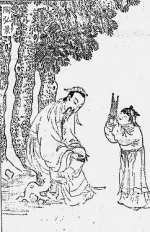Tao Hongjing
| Tao Hongjing | |
|---|---|

Daoist master Tao Hongjing
|
|
| Born | April 30, 456 Danyang, Jiangsu (near present-day Nanjing) |
| Died | April 19, 536 (aged 79) Maoshan (south of Nanjing) |
| Names | |
| Traditional Chinese | 陶弘景 |
| Simplified Chinese | 陶弘景 |
| Pinyin | Táo Hóngjǐng |
| Wade–Giles | T'ao Hung-ching |
| Courtesy name | Tongming (通明, Brightly Lit) |
| Posthumous name | Zhenbai xiansheng (貞白先生, Master Integrity) |
| Other names | Huayang yinju 華陽隱居 (Recluse of Flourishing Yang) |
Tao Hongjing 陶弘景 (456-536) was a polymath Chinese author, scholar, calligrapher, waidan alchemist, pharmacologist, and astronomer during the Northern and Southern dynasties (420-589). He is best known as a founder of the Shangqing "Highest Clarity" school of Daoism and the compiler-editor of the basic Shangqing religious texts.
There are a variety of sources about Tao Hongjing's life, from his own writings to biographies in the official Twenty-Four Histories. The British sinologist Lionel Giles said Tao's "versatility was amazing: scholar, philosopher, calligraphist, musician, alchemist, pharmacologist, astronomer, he may be regarded as the Chinese counterpart of Leonardo da Vinci" (1948: 106).
Tao Hongjing was born in Moling (秣陵, present-day Danyang, Jiangsu), which was near the Northern and Southern dynasties period capital Jiankang (present-day Nanjing). His father Tao Zhenbao (陶貞寶) and paternal grandfather Tao Long (陶隆) were erudite scholars, skilled calligraphers, and experts in Chinese herbology. His mother Lady Hao (郝夫人) and maternal grandfather were devout Buddhists. (Espesset 2008: 968; Knechtges and Chang 2014: 1077).
Tao was a prodigious reader and once his interest was aroused in a subject, he would not stop until he had learned all that he could (Greatrex 1998: 141). According to official biographies, he read the Daoist hagiography Shenxian zhuan (Biographies of the Divine Transcendents) at the age of ten, whereupon he decided to become a yǐnshì (隱士 "recluse; hermit") (Knechtges and Chang 2014: 1078).
...
Wikipedia
